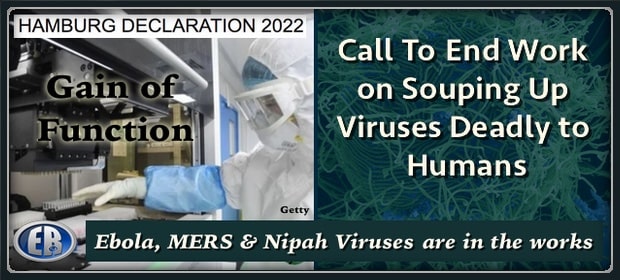
Scientists call for an immediate end to ‘gain-of-function’ research
The dangerous experiments with pathogens with global pandemic potential should stop, said Prof Roland Wiesendanger from the University of Hamburg in Germany and organiser of the call to end gain-of-function research.
FREEWEST MEDIA
“The current pandemic has taught us what devastating effects it can have when pathogens become extremely easily transmissible from person to person, even if the mortality rate due to the virus is only in the range of one percent or less. For at least ten years, dangerous pathogens such as avian flu viruses or SARS-like viruses have been adapted to human cells within the framework of so-called ‘gain-of-function‘ research, which involves an enormously high risk for the outbreak of worldwide pandemics. Such research projects continue to be financed – partly with public money – and this with much more dangerous viruses, some with lethality rates above 50 percent,” the authors said.
A virologist at a respected US research institute recently summed up the potential danger succinctly in one sentence as follows: “This pandemic is nothing compared to what comes next when we get airborne Nipah or Ebola.”
It is the responsibility of scientists and the media worldwide to point out this huge potential danger and to sensitise politicians as well as society as a whole. A group of scientists from various disciplines as well as from numerous countries in Europe, America, Asia and New Zealand are therefore now addressing the global community with the following “Hamburg Declaration 2022” with the aim of immediately ending the “gain-of-function” experiments with pathogens that are dangerous for humans.
This declaration was created in the spirit of the 1957 Göttingen Declaration, which drew attention to the potential danger posed by nuclear weapons systems.
Hamburg Declaration 2022
Conscious of the mission and responsibility of science and research to serve the welfare of humankind, to strive for truth and to communicate the knowledge gained to the general public, the signatories of this declaration wish to draw attention to a major threat to human existence that has arisen in recent years as a result of novel biotechnical processes for modifying dangerous pathogens.
Through so-called “gain-of-function” research, naturally occurring viruses are adapted by altering their gene sequence to facilitate their docking with and invasion of human cells. This creates an enormous potential for a pandemic, which responsible scientists and researchers have repeatedly pointed out over the past decade. Such research has been conducted in recent years on various highly dangerous pathogens such as avian flu viruses and SARS-like coronaviruses, and this has been documented in the scientific literature. Much of this work has also been done as part of publicly funded research projects.
The current Corona pandemic clearly shows what it means when pathogens are extremely easily transmitted from person to person. We have to mourn millions of deaths worldwide and billions of people are threatened in their existence or have lost it completely. The enormous damage to humanity occurred even though the mortality rate of the SARS-CoV-2 virus is only in the percentage range. There are indications that much more dangerous viruses such as MERS, Ebola or Nipah viruses are being genetically manipulated in various biotechnology laboratories around the world. The outcome of such experiments is often difficult or impossible to predict. However, no biotechnology laboratory in the world is safe enough to guarantee that such genetically modified viruses will not escape. A catastrophic event could be fatal for a substantial proportion of the world’s population, especially if the transmissibility of highly dangerous viruses via the human respiratory tract is facilitated by genetic modification.
We as scientists are aware of the importance of freedom of science and research. Nevertheless, we appeal to all politicians in the world to ensure that this “gain-of-function” research on pathogens with global pandemic potential is stopped immediately. The risk associated with this research and the potential of wiping out large parts of the world’s population are no longer responsible. We demand that the halt be controlled and continuously monitored by an independent international supervisory authority.
Regardless of the form of government of the countries of this world, it must be the concern of every responsible leader to contribute to the well-being of the population of his or her own country, but also of humanity as a whole. Humans have learned to intervene in the basic molecular building blocks of life. This gives rise to many opportunities to improve human life, but also to a great responsibility to preserve creation. Let us take this responsibility seriously before it is too late.
Roland Wiesendanger, Prof. Dr. Dr. h.c., Nanoscientist, University of Hamburg, Germany (Organizer)
Hiroshi Arakawa, Dr., Institute of Molecular Oncology, IFOM, Milan, Italy
Ute Bergner, Dr., Physicist, Jena, Germany
************
Source

••••
The Liberty Beacon Project is now expanding at a near exponential rate, and for this we are grateful and excited! But we must also be practical. For 7 years we have not asked for any donations, and have built this project with our own funds as we grew. We are now experiencing ever increasing growing pains due to the large number of websites and projects we represent. So we have just installed donation buttons on our websites and ask that you consider this when you visit them. Nothing is too small. We thank you for all your support and your considerations … (TLB)
••••
Comment Policy: As a privately owned web site, we reserve the right to remove comments that contain spam, advertising, vulgarity, threats of violence, racism, or personal/abusive attacks on other users. This also applies to trolling, the use of more than one alias, or just intentional mischief. Enforcement of this policy is at the discretion of this websites administrators. Repeat offenders may be blocked or permanently banned without prior warning.
••••
Disclaimer: TLB websites contain copyrighted material the use of which has not always been specifically authorized by the copyright owner. We are making such material available to our readers under the provisions of “fair use” in an effort to advance a better understanding of political, health, economic and social issues. The material on this site is distributed without profit to those who have expressed a prior interest in receiving it for research and educational purposes. If you wish to use copyrighted material for purposes other than “fair use” you must request permission from the copyright owner.
••••
Disclaimer: The information and opinions shared are for informational purposes only including, but not limited to, text, graphics, images and other material are not intended as medical advice or instruction. Nothing mentioned is intended to be a substitute for professional medical advice, diagnosis or treatment.




